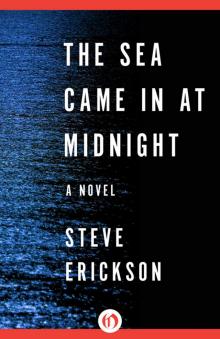- Home
- Steve Erickson
These Dreams of You Page 2
These Dreams of You Read online
Page 2
“O.K.,” says Sheba, and minutes later still waits. “Poppy, let’s go!” she says.
“Where?”
“THE PARK!”
“Tomorrow.”
“Yes,” she nods, and a minute later, “Are we going? WHY AREN’T WE GOING!” Even as she grasps other subtleties, she continues to be confounded by distinctions among weeks, days, hours, minutes. She believes her birthday both precedes and follows whatever day she occupies—not wrong, of course, technically speaking—appropriate for a child of civilization’s ground zero, the land where God placed Adam and Eve, the burial place of the oldest human fossil. “We are all Ethiopians,” Viv likes to say.
To the family, Sheba’s emotional need seems like a dark well that falls to time’s center. It sets in motion dynamics compounded by Sheba’s singular measure of things. “He’s number one!” she protests, pointing at Parker, “I’m number three,” and Zan can’t be sure if this is errant math, Ethiopia’s own system of measurement like its own calibration of time, or whatever manipulation knows to leave out two.
From the beginning Sheba has had an affinity for music. Because this is so much the stuff of racial cliché, Zan barely can tell people about the more earthbound aspects–the girl running for a piano like other kids to a scooter, warbling cheerfully in the yard of the orphanage back in Addis Ababa to the lightning in the sky–let alone that the girl’s small body literally hums with song.
Within a week of Sheba’s arrival, the family noticed it at the dinner table when everyone heard from her, barely audible, a distant music. “Sheba, we don’t sing at the table,” Viv gently tried to admonish her, until one day the mother is driving in Hollywood with Sheba in the backseat and picks up Zan’s broadcast from the canyon that usually she can’t get half a mile from the station. The girl transmits on Sheba frequency. Zan calls her Radio Ethiopia.
Up until around the time of Sheba’s adoption, Zan taught popular culture and Twentieth Century literature at a local college. The popular-culture course began with the year 1954, because that was when a white nineteen-year-old truck driver wandered into a Memphis recording studio—only weeks after the Supreme Court ruled racial segregation unconstitutional—and instinctively, unconsciously miscegenated, in the language of the time, white and black music. Caught up in the sweep of a story, by the end of every semester the students invariably shed their old-school/new-school distinctions to afford Zan an ovation. It’s the closest he’s come to telling an epic; he doubts he’s told a story better, certainly not any of his own.
The rest of the teachers in the department were childless and, as certainly was the case with Zan before he had children, there was little comprehension of the infinite variables that children bring, the way that children lay waste to rational odds, how one always has to err on the side of the long shot. Someone who doesn’t have children may grasp the volume of time they take up but can’t understand the way children won’t be compartmentalized, the way children can’t be consigned to their own rooms in the city of one’s life. Children are the moat that surrounds the city, the canals that run throughout. They get everything wet.
After the faculty meetings were changed to a day and time when Zan had to pick up kids from school, his resulting failure to attend brought down on him admonitions concerning language in his contract. Matters reached critical mass the afternoon that Zan left Parker waiting two hours so the faculty could debate whether a bartender should be hired at thesis readings. Not prone to explosions, Zan exploded anyway and walked out. “Some of us,” was the last thing he heard one of the teachers say, “liked the department better before he came.”
The suspension of Zan’s contract began the Nordhocs’ recession fifteen months before the rest of the country’s, or before the rest of the country knew theirs had begun too. A series of media and entertainment-industry strikes sidelined Viv’s career as a photographer snapping pictures locally for alternative weekly newspapers, sometimes nationally for entertainment magazines, of politicians and singers including not only the new president several years before his election but, some two decades past his prime, the redhaired glam-rocker whose music Sheba loves and Viv loved as well in her youth (distinctly marking her as an oddball among the teenage tribes of the Midwest). “Was his hair red?” Sheba asks, on raptly hearing the account of this photoshoot from her mother.
“Not as red as it used to be,” says Viv.
“Was he nice?”
“He was very nice,” Viv assures the girl, “one of the nicest, actually. Very charming, gracious.”
“He said grace?” The girl is dumbfounded. Often Sheba likes to say grace at dinner—just to get attention, her brother is convinced. God’s, at least, if nobody else’s.
Viv’s photography career has never recovered. The family’s income plummeted as Sheba arrived with new realities of $3,000 dental work, for which health insurance reimbursed $700. Viv and Zan have kept themselves afloat on credit cards in order to make the payments on their eccentric house; then the monthly mortgage went from $2,800 to $6,000 as the house’s value fell by a third.
It’s the perfect shitstorm of bad financial turns. Soon the front page of the newspaper and its running daily accounts of a nation imploding with debt and foreclosures read like the Nordhocs’ personal diary. Zan filed with the bank an application to rewrite the home loan, which was turned down because the family was current in its payments; a second application was turned down a week before the bank was taken over by another bank. The Nordhocs fell behind in the payments, offering partial sums that they subsequently learned weren’t applied to the balance on the house but rather put in a separate escrow so the bank could continue to charge delinquency fees and push the family toward foreclosure. A third application was turned down as being “incomplete,” though over the course of five months and many phone calls no one from the bank ever said the application was amiss; Zan filed a fourth application that was approved—at a monthly payment of $6,500. No one at the bank could or would explain how this figure was arrived at or why the bank offered a payment that was more than what led the Nordhocs to file the application in the first place.
Now Zan and Viv are many months delinquent on the house, which has been scheduled for foreclosure twice only to receive stays of execution at the last moment. Their debt to credit card companies has reached a level Zan doesn’t want to know. “We don’t know how much we owe?” Viv whispers so the kids won’t hear.
“We do know,” says Zan. “A lot.”
“But shouldn’t we figure it out exactly?”
“No.”
“No?”
“No.”
“Why not?”
“Because,” Zan says, “I need to be able to get out of bed in the morning. Because quantifying it with more precision won’t make it any less or any easier to deal with. Because sometimes you need a little denial in order to function.” In his head Zan figures it’s about $135,000. Various credit accounts have been closed or canceled or their limits strategically have been lowered to less than the balance. Wall Street hounds the Nordhocs ceaselessly, phoning hourly; if Zan scrounges up a grand on a $1,200 bill, the lender relentlessly pursues the outstanding $200 dawn till midnight. New bankruptcy laws are a Rube Goldberg contraption, disqualifying the family for owing too much or too little, for earning too little or too much. Zan’s conversation with an attorney about the situation is the financial equivalent of being told by a doctor he’s terminal.
Over the course of all the mortgage applications to the bank, Zan has made countless phone calls, copied countless documents, made personal appearances at the lender’s local branch to plead the case. He has consulted three government agencies and eight lawyers, several of whom he’s paid hundreds of dollars for expertise that proved something less than Zan’s. Those not crooked enough to provide useless advice confessed they were too confused to provide any advice at all.
In the ten years since they bought it, Zan and Viv came to love the house more than eit
her might have imagined, particularly after virtually rebuilding it from the ground up. Looking out on a canyon vista, the house is an ark of CDs and books, Viv’s photos and butterfly collection and her art that’s become a nexus of the two, all ready to float away on the tsunami that their twelve-year-old son expects to see advancing through the canyon from the sea.
Zan admonishes himself that pending displacement is the inevitable fate of those who invest in any place too much. He knows that one day soon the house will reappear on the bank’s radar, a new Notice of Sale giving Zan, Viv, Parker and Sheba three weeks before they’re homeless. The parents try to keep it from the children but Zan is certain that Parker, not only a smart but intuitive kid, knows something is wrong. “Promise me,” the boy says one day in the car, “that we’re not going to move,” and Zan chokes, “I promise,” and ponders the expiration date of lies to children.
Finances weigh down everything. At least twice a day Zan goes online with a knot in his gut to check evaporating bank balances and a loan-processing website that lists which houses have had new foreclosure dates posted.
He believes it’s killing him. It coincides with the hackneyed gloom of autumnal years, the astonished pall at the great approaching wind-down; it never occurred to him that life would get harder rather than easier. He travels in a movable depression with headaches that never end, locating themselves around one eye like a vise when he wakes in the morning and goes to bed at the end of the day and wakes again the next morning. Gobbling imitrex nightly for the migraines and diovan daily for blood pressure, he believes that if by some miracle he and Viv should extricate themselves from these circumstances, within months, weeks, maybe days or moments some fatal illness will manifest itself—because at the same time he believes that their money crisis is killing him, he’s also convinced that fate is a trickster. At the same time that it’s killing him, the constant war for economic survival also is the thing keeping some other doom at bay. Fate waits for the most delicious moment to play its ultimate trick, in some unlikely future when everything finally is all right.
While Zan feels foolish that it’s taken him a lifetime to know it, it’s reassuring to finally understand that the banks are evil. It lends to the situation a clarity that’s confirmed by every contact and transaction. You don’t want this house, he tries to explain, pillaged by my children and covered in my wife’s butterfly wings, no doors on half the rooms and its driveway so steep it’s practically vertical. You’re never going to find anyone else who wants to live here. “Loan number?” asks the lender on the other end of the line, in a ritual now familiar enough that Zan has made it a point, on general principle, not to know the number by heart. “Three zero six one three nine five one nine eight,” he reads from the application.
“Address?” the woman says.
“1861 Relik Road. That’s R-e-l—”
“Are you receiving mail at that address?”
“Yes.”
“Are you living at the residence?”
“Yes.”
“You are not renting the dwelling or—”
“We live here. It’s our home.”
“You have an outstanding balance on the property of one million, one hundred forty-seven thousand five hundred sixty-two dollars and eight cents. Are you prepared to make a payment in that amount today?”
“No,” Zan sighs.
The lending agent says, “How then may I assist you today, asshole?”
Zan looks at the phone in his hand. “Excuse me?” he says.
“How may I assist you today?” she says.
“That isn’t what you said.”
There’s silence on the other end of the line. “I’m sorry?”
“That isn’t what you said.”
“That is what I said.”
“You said something else,” Zan insists.
“That is what I said, sir. How may I assist you today?”
Zan chews over the moment and clears his throat. “I’m calling to find out the status of our most recent application for a modification of our home loan. This is the fifth we’ve submitted.” He thinks. “Or maybe the sixth.”
“Let me review that,” she answers, and there’s a pause. Then, “The application is still being processed, motherfucker.”
Now Zan doesn’t feel the need to examine his telephone. “What?”
“The application is still being processed.”
“That isn’t what you said. You said something else.”
“I’m sorry?”
“You said something else. What did you call me?”
Another pause. “Sir, I’m not sure what you think I said, but the application is still being processed and a modification officer will be getting back to you. Cocksucker.” Lying in bed at night, Zan concludes that maybe the new president isn’t going to save their house. He gets up and turns on the light because otherwise he becomes insufferable even to himself, in his sense of persecution and guilt over how his children now find themselves in this predicament. He wonders about the terms of his life insurance policy and how it might take care of his family if he could somehow will himself into an aneurysm; he reflects on the perversity of karma and how it could be that the family’s luck could go so bad on the occasion of adopting an African orphan. Aren’t you supposed to get points for that on the karmic scoreboard? He muses (if that possibly can be the word) on how his time is nearly over and yet his moment, whenever or whatever that ever was supposed to be, still hasn’t come. He thinks about his father-in-law who died six years ago and his last words: “That went fast.”
Once the preconceptions of meek Dickensian orphanhood have been laid to rest, Zan realizes that Sheba is the single most defiant child he’s known. If need be, she’ll abdicate the role of child altogether in order to assume authority; she self-administers time-outs when the parents don’t.
“I’M HUNGRY, YOUNG MAN!” she bellows at her father when she wants something to eat. She calls Viv “young lady” and Parker “baby,” which incites the boy into answering, “You’re the baby, you’re the baby!” Eventually Sheba expands defiance’s repertoire, the tenor of insult becoming more nuanced until finally, some months later in London when she, Parker and Zan wait to board a double-decker bus, she snarls to the father, “Out of my way, old man.” Drawing her finger across her throat at him, she stuffs her thumb back in her mouth like Churchill corking his face with a cigar. “I’m a professional!” is her latest rallying cry and coup de grâce, learned from her brother or television and employed to end any contentious conversation. “Eat your carrots, Sheba,” says Viv.
“Leave me alone!” says Sheba. “I’m a professional!”
“Clean up your room.”
“I don’t need you telling me, I’m a professional!” When she becomes a teenager, Zan grimly resolves, I’m faking my death. A particularly boisterous and pyrotechnic plane crash off the coast of Tahiti, or a naked walk into a ravenous sea.
Earlier in his life, Zan decided it’s the scandinavian in him that accounts for the pathological orderliness he since has surrendered. This realization preceded another that he lives with four agents of chaos, if you count the dog; but his attempted reconciliation with chaos notwithstanding, the violation of the house by rats represents something so primal he can’t abide it despite the house itself having become a locus of uncertainty. He dreams of rats the night that Viv tells him she’s counted four. He dreams of them coming out of the holes that his son has punched in the walls in small explosions of new adolescent violence; one night Viv wakes to something running down her arm. Zan will let a tsunami take the house before the bank does, but not the rats, not yet.
Some years ago Zan had the house sealed, so he isn’t sure where the breach has occurred. It’s possible, he believes, that the rats came right through the front door, which sometimes has stood open for hours when Chaos Agent Number Four, otherwise known to Zan as the Fucking Dog, pushes his way in. Whatever the explanation, now the vermin can be heard scampering
across the kitchen floor at night and scurrying through vents. For $500 that they don’t have, Zan hires an exterminator, an aging latino giant named Jorge who lumbers through the house and crawls beneath it laying traps.
Every week Jorge returns to the house and retrieves the traps with the snapped carcasses of rodents, about which he talks with a tenderness born of an executioner’s familiarity.
To Zan he describes the animals’ habits and patterns intimately, lowering his voice—so the children won’t hear—on the grislier details such as the rats cannibalizing each other. Several weeks and half a dozen dead rats later, the family still can hear them, with Piranha particularly agitated, periodically ransacking the house at the rodents’ sound and scent. “He doesn’t have trouble cornering FedEx drivers,” Zan notes. “But a rat he can’t catch.”
“A FedEx driver is bigger than a rat,” Parker defends his dog. “The FedEx driver isn’t hiding in the vent.”
Zan broadcasts his radio show from a station located behind the local Mexican eatery called the Añejo. This is up the road from an old abandoned railway car that was turned into a bridge and crosses a creek that rises with the winter and vanishes in the hot summer. For a man given to silences, he’s loquacious on his broadcast. “You say more on the radio in five minutes,” Viv points out, “than you do in a week off it.”
“That’s because,” Zan explains, “on the radio no one interrupts you. It’s the closest to writing that talking gets.” Still he concedes that a life on the airwaves isn’t something most people would have foreseen for him. “This is Radio Zed,” he intones, “as in the numerical designation of the decade we live in, broadcasting to all corners of the canyon and, who knows, maybe beyond. We opened today’s show with Augustus Pablo’s ‘Chant to King Selassie,’ followed by ‘Tezeta’—which means ‘memory’—by the Duke Ellington of Ethiojazz, Mulatu Astatke, then Delroy Wilson’s ‘This Life Makes Me Wonder.’ Polly Jean Harvey’s ‘The Wind’ was in honor of the coming Santa Anas that strike terror in all our canyon hearts during fire season, and the song by Van Morrison about Ray Charles, who ‘was shot down but got up to do his best,’ was followed by the Genius himself with ‘Busted,’ in honor of our bank statement. We ended with ‘Always Crashing in the Same Car,’ back from the days when my daughter’s favorite rock star was hanging in Berlin. As usual, that one’s for Sheba,” says Zan, “but also in honor of the time Parker and I hit an oil slick on the way to school and spun out on the boulevard half a mile from here—which is to say almost within the sound of my voice.”

 ARC D’X
ARC D’X Amnesiascope
Amnesiascope Our Ecstatic Days
Our Ecstatic Days Amnesiascope: A Novel
Amnesiascope: A Novel Zeroville
Zeroville The Sea Came in at Midnight
The Sea Came in at Midnight These Dreams of You
These Dreams of You Zeroville: A Novel
Zeroville: A Novel Days Between Stations
Days Between Stations (1993) Arc d'X
(1993) Arc d'X Full-Blooded Fantasy
Full-Blooded Fantasy